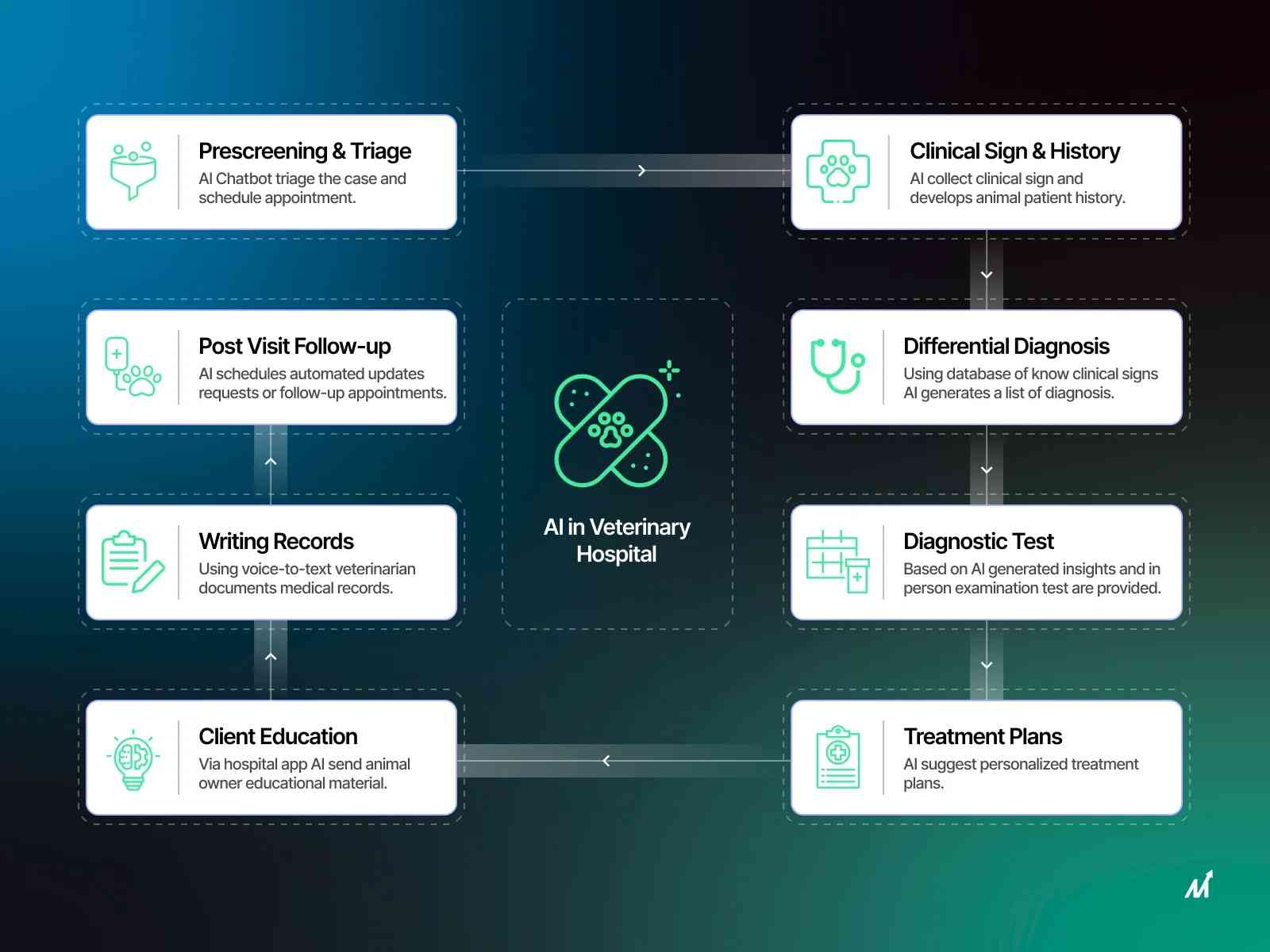AI in Veterinary Medicine: Advancing Care and Reducing Costs

Artificial intelligence (AI) is transforming the landscape of veterinary medicine, offering groundbreaking solutions to enhance care, streamline operations, and reduce costs. By enabling data-driven, personalized, and preventative approaches, AI is revolutionizing the way veterinarians diagnose, treat, and monitor animal health.
Growing Adoption of AI in Veterinary Practices
The integration of AI in veterinary medicine is gaining traction. A survey by Digitail and the American Animal Hospital Association reveals that 39.2% of veterinary professionals are familiar with AI, and 69.5% report using AI tools daily or weekly. This increasing adoption highlights AI's critical role in shaping the future of animal care.
Key Applications and Benefits of AI in Veterinary Medicine
AI supports veterinarians in multiple ways, from diagnostics to operational efficiency. Here are the primary applications and their benefits:
1. Automated Diagnosis
AI processes large datasets, such as medical records and imaging results, to identify patterns and deliver accurate diagnoses. This accelerates treatment and enhances care outcomes.
2. Predictive Analytics
AI analyzes historical and real-time data to predict health risks. Early detection enables preventive measures and timely interventions, often improving prognosis.
3. Behavior Monitoring
Advanced systems track animals' activity, sleep, and eating habits. Subtle changes in behavior trigger alerts, allowing early detection of potential health concerns.
4. Personalized Treatment Plans
AI develops tailored treatment recommendations based on medical history and similar cases. This approach enhances treatment effectiveness and animal recovery.
5. Image Analysis
AI-powered tools quickly and accurately analyze X-rays, CT scans, and other diagnostic images, identifying abnormalities and assisting in critical care scenarios.
6. Disease Surveillance
AI monitors and analyzes disease patterns, helping detect outbreaks early. This is particularly valuable for zoonotic diseases, protecting both animals and humans.
7. Inventory Management
AI optimizes inventory tracking, ensuring clinics maintain appropriate levels of supplies while reducing waste and costs.
8. Telemedicine
AI supports remote care through telemedicine, enabling veterinarians to provide consultations and advice regardless of location.
9. Patient Monitoring
Continuous monitoring systems powered by AI detect health issues early, improving outcomes for chronic conditions and post-surgery recovery.
10. Client Communication
AI-driven chatbots streamline communication, answering common questions and improving customer satisfaction while freeing up clinic staff for other tasks.
Classifying AI Applications in Veterinary Medicine
AI tools in veterinary medicine are classified based on their impact on clinical outcomes and operational efficiency:
Class I: Low-Impact Systems
These systems enhance administrative tasks, like scheduling and billing, without directly influencing patient care. They are easy to adopt and require minimal oversight.
Class II: Medium-Impact Systems
AI tools in this category assist in clinical decision-making, offering recommendations while leaving final decisions to veterinarians. Examples include symptom checkers and triage tools.
Class III: High-Impact Systems
These systems provide diagnostic or predictive insights, such as interpreting radiographic images or detecting diseases. Due to their direct impact on treatment, they require thorough validation and oversight.
Markovate: Partnering for Customized AI Integration
Markovate specializes in integrating AI into veterinary practices, tailoring solutions to meet unique needs and improve operations.
1. Clinical Decision Support
We enhance existing platforms with AI-based decision support, helping veterinarians make confident, data-driven decisions.
2. Advanced Diagnostics
Markovate integrates AI into diagnostic systems, improving the speed and accuracy of detecting conditions.
3. Predictive Health Monitoring
By adding AI to monitoring systems, we enable proactive care, reducing health risks and improving outcomes.
4. Operational Automation
AI-powered tools streamline administrative tasks, reducing workload and improving efficiency.
5. Continuous Optimization
Markovate ensures seamless integration and ongoing updates, allowing practices to evolve with AI advancements.
The Future of AI in Veterinary Medicine
The adoption of AI in veterinary medicine is set to grow, offering significant advantages:
-
Enhanced Productivity: Automating repetitive tasks boosts efficiency.
-
Improved Diagnostics and Care: Data-driven insights lead to better outcomes.
-
Cost Reductions: Optimized operations reduce overhead expenses.
AI is poised to transform veterinary medicine into a more responsive, efficient, and personalized field. From real-time diagnostics to predictive health monitoring, its applications promise to enhance care for animals and ease operational burdens for veterinarians.
For veterinary practices ready to embrace AI, the future is full of opportunities to deliver exceptional care while maintaining operational excellence.
- Industry
- Art
- Causes
- Crafts
- Dance
- Drinks
- Film
- Fitness
- Food
- Games
- Gardening
- Health
- Home
- Literature
- Music
- Networking
- Other
- Party
- Religion
- Shopping
- Sports
- Theater
- Wellness
- News


